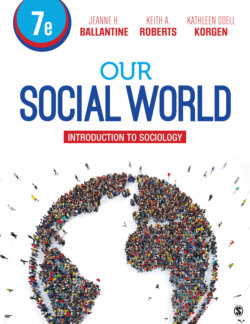Читать книгу Our Social World - Kathleen Odell Korgen - Страница 83
На сайте Литреса книга снята с продажи.
Max Weber’s Contributions.
ОглавлениеMax Weber (1864–1920), a German-born social scientist, has had a lasting effect on sociology and other social sciences. Weber (pronounced VAY-ber) cannot be pigeonholed easily into one of the theoretical categories or one level of analysis, for his contributions include both micro- and macro-level analyses. His emphasis on Verstehen (meaning deep empathetic understanding in humans) gives him a place in micro-level theory, and his discussions of power and bureaucracies give him a place in meso- and macro-level theory (Weber 1946).
Verstehen stems from the interpretations or meanings individuals at the micro level give to their social experiences. Weber argued that to understand people’s behaviors, you must step into their shoes and see the world as they do. Following in Weber’s footsteps, sociologists try to understand both human behavior and the meanings that people attach to their experiences. In this work, Weber is a micro theorist who set the stage for symbolic interaction theorists.
However, the goal-oriented, efficient new organizational form called bureaucracy was the focus of much of Weber’s writing at the meso level. This organizational form was based on rationality (the attempt to reach maximum efficiency with rules that are rationally designed to accomplish goals) rather than relying on long-standing tradition for how things should be done. As we describe in Chapter 5, Weber’s ideas about society at the meso level have laid the groundwork for a theoretical understanding of modern organizations.
Weber also attempted to understand macro-level processes. For instance, in his famous book The Protestant Ethic and the Spirit of Capitalism (Weber [1904–1905] 1958), he asked how capitalists (those who have money and control production) understood the world around them. His work was influenced by Marx’s writings, but whereas Marx focused on economic conditions as the key factor shaping history and power relations, Weber argued that Marx’s focus was too narrow. Weber felt that politics, economics, religion, psychology, and people’s ideas are interdependent—affecting each other. In short, Weber thought that society was more complex than Karl Marx’s theory, which focused only on two groups—the haves and the have-nots—in conflict over economic resources.
